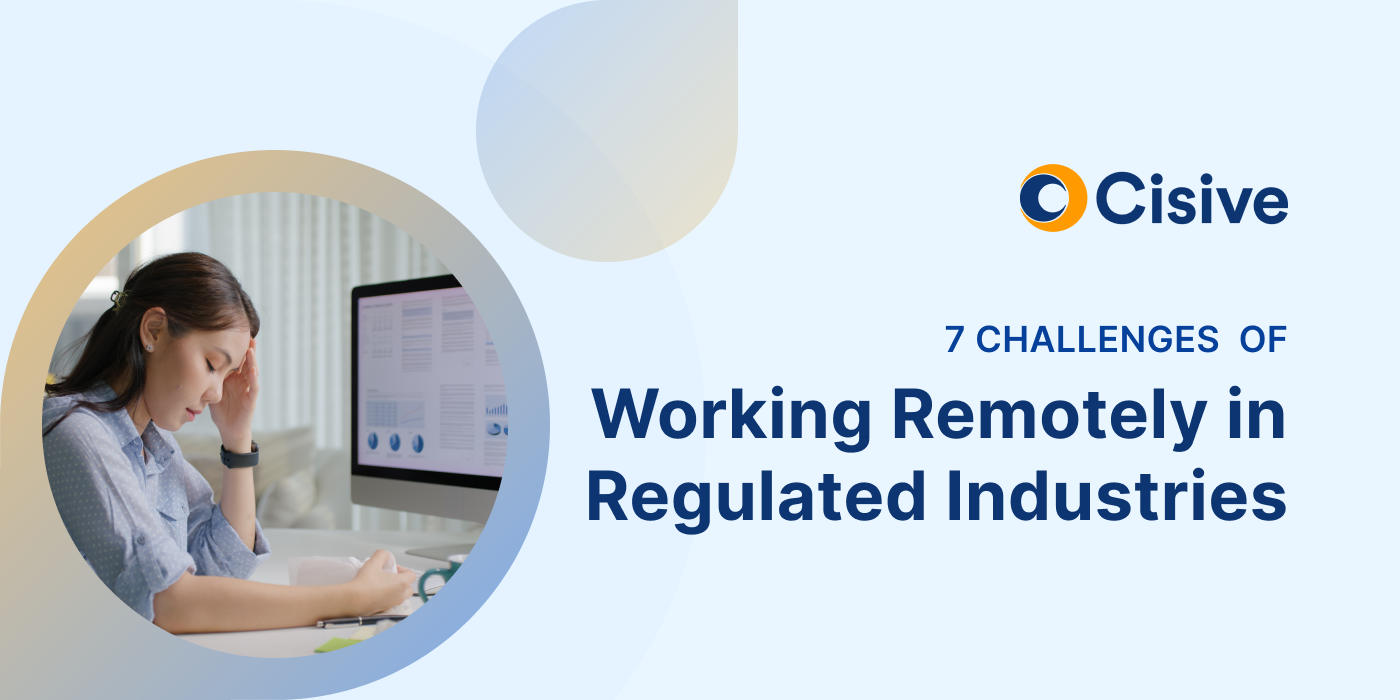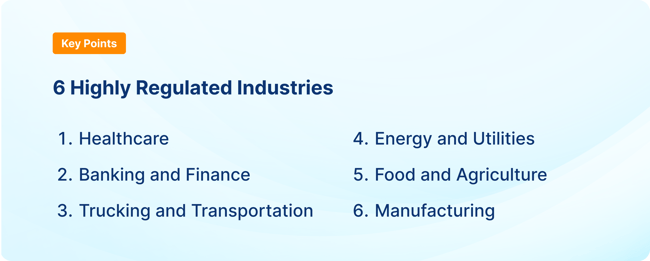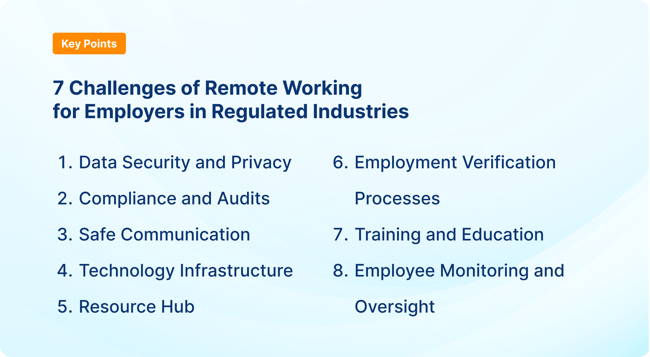

Bad hires cost businesses. The United States Department of Labor reports that hiring the wrong...

Remote work has expanded in recent years, whether as a full-time setup or as part of a hybrid schedule. While this shift offers numerous benefits, there are also distinct challenges of remote working — particularly in highly regulated industries.
Industries such as finance, healthcare, and transportation face compliance and oversight requirements that complicate remote work arrangements.
These remote work challenges include employee communication on non-work devices, cybersecurity and data protection, and proper monitoring of remote workers across time zones.
Discover some of the top challenges of working remotely in regulated industries and how you can overcome them.
Top three takeaways:
|

Compliance is paramount in highly regulated industries. The following industries have strict rules and regulations that companies follow. In this section, we will explore the challenges and considerations of managing a remote workforce in these industries.
Healthcare ranks among the topmost regulated sectors, as healthcare workers are responsible for public safety and patient outcomes. They also handle sensitive data that’s protected by federal law.
While most clinical healthcare roles work in person at hospitals, clinics or other medical facilities, the increase in telehealth means that more healthcare team members operate remotely.
More than 40% of healthcare practitioners and technical workers work remotely at least some of the time, while 27% do so all the time and 16% have hybrid schedules. People in other roles, such as medical coders or healthcare consultants, also work remotely, where they handle sensitive patient data.
The Health Insurance Portability and Accountability Act (HIPAA) protects the privacy and security of patients' personal health information, including how medical records, test results, and patient details are handled. HIPAA applies to health plans, healthcare providers, and healthcare clearinghouses, as well as business associates working for a covered entity.
Healthcare institutions are responsible for securing patient data and controlling access, which can be especially challenging in a remote setting.
Banks and financial institutions deal with sensitive personal information related to consumer identity, finances, and income, among other data.
Since the pandemic, more financial services employees are working at least partly from home. Only 20% of financial services companies surveyed by Scoop in late 2022 and early 2023 required full-time office attendance.
Data privacy and security can be harder to maintain in remote work settings, and regulators are penalizing organizations that don’t take precautions.
The Securities and Exchange Commission (SEC) fined eight Wall Street companies a total of $111 million for discussing business on unapproved channels, such as WhatsApp or text messages.
Additional laws govern how companies handle consumer financial data in remote settings. The Gramm-Leach-Bliley Act, for example, requires institutional safeguards to protect the security and confidentiality of customer data. Financial institutions must prioritize compliance with data privacy and communication practices when adopting long-term remote work.
Trucking and transportation regulations govern commercial vehicle operations and driver hiring, training, and licensing.
While much work in the trucking industry is performed in the field, some roles can be done on-site or remotely. Dispatch and logistics coordinators, for instance, can operate from any place with a stable internet connection.
Transport industry standards require documentation of safety records, guidelines, and communication with drivers in the field. Remote work adds a layer of complexity to these processes.
Laws governing the energy and utilities sector focus on worksite safety, public safety, and environmental protection. But the Federal Energy Regulatory Commission is also paying attention to cybersecurity, including in the sector’s supply chain.
Without proper infrastructure, it’s not just workers in coffee shops logging into unsecured public networks that create risks. Even personal home office networks can be more vulnerable to cyberattacks than a secure, on-site company network.
This risk is magnified for employees who work on government contracts in the energy and utilities sectors.
Energy companies and utilities must develop remote work infrastructure to protect sensitive data, as well as stronger vendor screening processes to protect their technology ecosystem.
Cyberattacks are one of the greatest threats to the food and agriculture industry, with many bad actors targeting employees in attempts to access sensitive data that could compromise entire supply chains.
To counter these attacks, the Information Technology Information Sharing and Analysis Center launched Food and Agriculture — Information Sharing and Analysis Center., which aims to help companies in the industry detect and prevent cyber threats.
The manufacturing industry is becoming more automated and digitized, with a variety of remote access and monitoring technologies enabling remote oversight of factory floors. But without the right security framework, that same technology is vulnerable to attack.
Plant owners need top-flight vendor screening, along with proper access controls that only let authorized workers use remote-access technologies.

Remote working poses unique challenges for employers in high-risk industries. You need to know your biggest risk areas and how to address them proactively.
Here are seven of the main challenges of remote working and how you can overcome them.
Storing, accessing, and transmitting sensitive data in remote work settings poses risks.
One concern is when remote workers log into unsecured home networks or public networks, which lack the security measures of on-site, corporate-managed networks. This creates a vulnerability for malicious actors to exploit by trying to access or intercept sensitive information. The worst-case scenario is a data breach, identity theft, or other cybersecurity incident.
Organizations must educate remote teams about the importance of using secure networks and virtual private networks (VPNs) to protect sensitive data. Regular training and reminders can help remote workers understand the risks and take the necessary precautions.
The devices your remote team uses can also pose security risks. Personal devices might not have the same level of security as company-provided devices, making them more vulnerable to malware, viruses, or hacking attempts.
This increases the likelihood of unauthorized access to sensitive data, data breaches or other incidents. Additionally, personal devices might not be up to date on security patches, further exposing them to vulnerabilities.
Every company should have policies about the use of personal devices for work purposes. Even if you allow the use of personal devices, go take whatever precautions you deem necessary to protect sensitive data and remain in compliance.
Compliance requires monitoring whether employees and the company meet regulatory requirements and industry standards. This process can involve tracking and evaluating daily activities, processes, and records.
Compliance monitoring is crucial in highly regulated industries to mitigate risks, maintain legal and ethical standards, and avoid penalties or reputational damage. Companies in regulated industries face regular audits and inspections, which are more complicated with remote work arrangements, especially when physical access to facilities is required.
You will need to demonstrate compliance through recordkeeping, policies, and procedures (such as two-factor authentication or VPN usage). The SEC, for instance, can require a SOC 2 audit of information security processes. As a best practice, prepare for official audits by conducting your own — a pre-mortem that identifies and addresses weak spots before a regulator spots them.
This approach will improve your remote security framework and reinforce data privacy best practices.
Communication in highly regulated industries isn’t just a “nice to have;” it’s often a regulated activity that requires clear policies, procedures, and recordkeeping. Bank call center employees, for example, must follow security protocols outlined by the Payment Card Industry Data Security Standards for call centers.
Securing and encrypting communication in remote work settings can be challenging. Make sure remote team members know to only use secure communication channels that are company-approved and address communication gaps.
Another challenge is when employees use weak passwords or when applications lack strong password protocols, which helps hackers gain access to communication channels. Additionally, the use of personal devices on unsecured networks by remote workers increases the risk of data breaches or the interception of sensitive information.
Take steps to educate employees about the importance of good team communication practices. Offer guidelines and advice on how to use encrypted channels and implement multi-factor authentication and other measures to enhance remote teams' security.
Highly regulated industries must maintain a robust technology infrastructure that meets regulatory standards, provides secure access to systems and data, and is regularly updated and stress tested. Remote working environments often lack the physical security measures in a traditional office environment. This makes it easier for sensitive information to be compromised.
In regulated industries, unsafe technology setups can lead to noncompliance penalties, reputational damage, and loss of customer trust. Additionally, remote employees may become targets for phishing scams, malware, and other cyberthreats, putting their personal and professional information at risk.
Make sure IT establishes a few guidelines and offers equal support for remote teams across time zones. This support should be proactive, as remote team members might be feeling isolated and reticent to speak up about concerns or potential threats when they're not in the same office.
Prioritize VPN access for all remote workers, whether they are always at home or are working remotely in the field or while traveling. A VPN creates a secure connection between an employee's device and the company's network, protecting sensitive data from unauthorized access. IT support is crucial to getting employees set up with VPNs and other security measures.
The hiring process for remote team members in highly regulated industries requires additional security and verification measures, especially when they are applying, interviewing, and working remotely. You need to ensure they are who they say they are and that they have the right credentials.
One challenge is the difficulty of physically inspecting original documents during the verification process, such as identification cards or education credentials, when many remote workers are across different time zones. Recent updates to Form I-9 allow for remote verification, but you still need to know what to look for to meet federal requirements, including E-Verify submissions.
Many roles in highly regulated industries require specific licenses and certifications. The Federal Motor Safety Administration (FMCSA), for example, requires employers to verify that truck drivers hold commercial driver’s licenses.
Healthcare employers, meanwhile, must verify credentials when hiring people who work directly with patients, as well as ongoing learning and recertification credits.
Verifying those credentials for telehealth medical staff services or traveling workers, for example, adds even more complexity to an already challenging situation.
Regulatory compliance requires ongoing employee training and education. Without the right training, employees will make more mistakes, with dire consequences for them, those they serve, and your organization — including legal ramifications, fines and other penalties, and reputational damage.
Poor compliance training also reduces team member awareness of the risks of remote workplaces, jeopardizing employee safety and the security of sensitive information. Delivering this training can be more difficult when team members are working remotely, and are no longer in the same time zone.
Tools like PreCheck’s LicenseManager Pro® for healthcare remote employees can help you ensure your entire team remains up to date on training and licensing requirements.
Remote working can make it more challenging for organizations to track and oversee employee activities.
When managers can’t directly supervise their teams, they can struggle to ensure that remote staff follow rules, regulations, and ethical standards.
Without proper oversight, remote team members may engage in non-compliant behaviors or take shortcuts that compromise safety or ethics. This can create a culture of non-compliance and increase the likelihood of regulatory violations.
Limited oversight can also complicate the detection of such risks or inappropriate actions in a timely manner. Without regular monitoring and supervision, compliance breaches may go unnoticed, allowing them to escalate and cause more harm to the organization.
Partner with a reputable background screening provider to identify candidates who will thrive in remote settings while maintaining compliance with rules, regulations, and ethics.
Background screening helps you identify new team members you can trust to maintain compliance every day, including in remote settings.
By conducting thorough background checks, you can examine a candidate's past behavior, qualifications, and record of integrity, helping to assess their suitability for remote work in highly regulated sectors.
Want to learn more? Schedule a time to speak with one of our background screening experts.
Author: Cisive Staff
Bio: Contributed by a member of our staff with expertise in background screening for highly regulated industries.
Let's Connect on LinkedIn
Bad hires cost businesses. The United States Department of Labor reports that hiring the wrong...

The COVID-19 pandemic catalyzed a significant shift in the professional landscape, ushering in the...

Every company employing drivers needs to make sure they’re hiring qualified, safe motor vehicle...